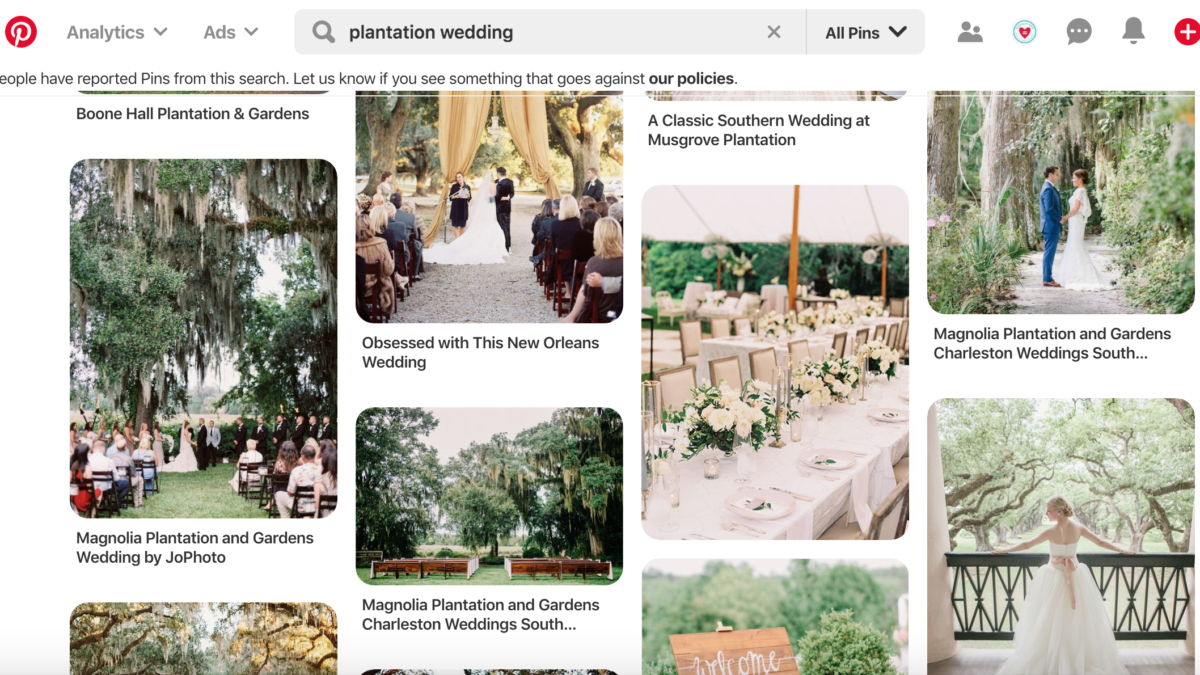The Knot Worldwide and Pinterest announced that they will no longer be promoting plantation wedding venues or wedding content that romanticizes former slave plantations, according to BuzzFeed News. Representatives told Buzzfeed, who reported the story, that both of the major online wedding-planning platforms will be making this change.
The change to policy means that while plantations can still be listed as wedding vendors on The Knot and WeddingWire (both are now owned by the same company, The Knot Worldwide), they cannot use language that glorifies or romanticizes the venue’s history as a plantation. Words like “charming” and “elegant,” which are commonplace in the wedding world, are no longer appropriate for former plantations. The guidelines apply to all venues that are former slave plantations, not just the ones that actively market themselves as such.
“We want to make sure we’re serving all our couples and that they don’t feel in any way discriminated against,” chief marketing officer of The Knot, Dhanusha Sivajee, told BuzzFeed News.
Pinterest will also restrict plantation wedding content on its platform, according to a company spokesperson in conversation with BuzzFeed News. Users will still be able to search for wedding content featuring plantations but they’ll now see a warning that the content they’re viewing might violate Pinterest’s policies. The company is also working on de-indexing Google searches for plantation venues on the site.
The change in The Knot and Pinterest’s policies comes after pressure from the civil rights advocacy group Color of Change. “The decision to glorify plantations as nostalgic sites of celebration is not an empowering one for the Black women and justice-minded people who use your site,” Color of Change wrote in a letter that the group sent to The Knot Worldwide.
Equally Wed doesn’t accept wedding vendors or advertisers that are former slave plantations for this reason. “Plantations—or forced labor camps, rather—were built on the beaten and whipped backs of Black people,” explains co-founder and editorial director Kirsten Ott Palladino. “I’m of the notion that there’s nothing good about glorifying such places, which is why we don’t publish any weddings or engagements from plantations on Equally Wed, nor will we accept advertisements from known plantations.”
Allison Davis, founder and principal producer of luxury wedding and event planning company Davis Row, believes there are ethical alternatives to plantation weddings that give marriers the Southern antebellum charm they’re looking for. “I’m feeling optimistic about Pinterest and The Knot’s decisions around plantation wedding venues and related content in their communities,” Davis told Equally Wed. “The plantation aesthetic shouldn’t be used as a positive marketing tool, especially when the historical truths are so painful for so many people.”
Color of Change urged several other wedding planning platforms and media to stop promoting plantations, including Zola, Brides and Martha Stewart Weddings.
Zola decided to make the change one day after The Knot and Pinterest, according to BuzzFeed News, and will be removing all plantation venues from the site and re-examine existing content that features plantations. “We appreciate Color of Change for bringing this issue forward, and will work with them and additional organizations to ensure our policies and guidelines are inclusive and make everyone feel welcome,” Zola spokesperson Emily Forrest told BuzzFeed news.
DotDash, the parent company that owns Brides, said that mentions of plantations have now been removed from its website. Martha Stewart Weddings initially did not respond to Color of Change’s letter but sent a statement to BuzzFeed News stating that the company is thoughtfully considering the concern.
All wedding media need to listen to this simple request: Stop featuring former slave plantations. They’re not charming or rustic, they are living reminders of trauma and injustice.
Fin Leary Lavoie
1 Comment
Leave a Reply
You must be logged in to post a comment.































Do you know if they’ve posted a list of properties they recognize as former plantations? I want to know if they include Montage Palmetto Bluff, which is indeed a former plantation — although locals dislike referring to it that way. (I used to work there.) Hurrah for these publishers recognizing that plantations represent torture, pain, incredibly inhumane treatment of people, and, specifically in South Carolina: secession (which could be read as treason). My opinions will not be popular with some people, but inclusion and human rights are more important to me!